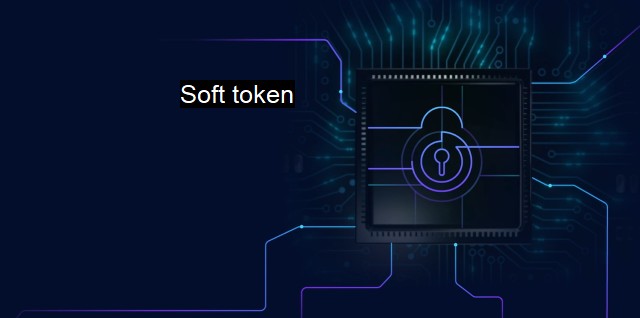What is Soft token?
Digital Security and Antivirus Systems: Exploring the Importance and Contexts of Soft Token Authentication as a Vital Access Control Method"
Soft token, also known as a software token, is a type of security measure used in the digital world to prevent unauthorized access to sensitive data. Soft tokens are part of the authentication process used in cybersecurity to confirm the identity of a user or network. The use of software tokens is part of a dual or multi-factor approach, where more than one means of identification are used to increase the security of data and systems.A software token is a form of password, a unique one-time password (OTP) that is typically generated by software running on a specific device. It comes from their software nature and is usually found applications, making them easily portable and convenient without carrying a physical device. The software token is provided through an application, website, or sent through email or SMS, and has a limited life span, usually just a few minutes to enhance its security.
The concept of a soft token works together with the concept of two-factor or multi-factor authentication (2FA or MFA). Two-factor authentication requires users to provide at least two proofs or factors to prove their identity. These factors are usually divided into something a user knows, something a user has, and something a user is. A password or a pin, that a user knows, in combination with the soft token that user possesses - in their mail, SMS, or device application - providing more robust security.
The importance and relevance of soft tokens in terms of cyber threats cannot be overstated. Cyber threats and data breaches are often the result of weak, insecure, or stolen password credentials. The implementation of soft tokens presents a more difficult challenge for hackers attempting to breach a system. Given that the created OTP changes constantly and unpredictably, the chances of cybercriminals accurately accessing it are marginal to none.
Soft tokens tend to reduce costs and time for businesses as they don't need to distribute hardware tokens to their employees. It increases the productivity as employees could access company resources from anywhere with proper authentications and reduced perils. Further, personal users, too, prefer soft tokens as their daily online actions – social media, online banking, personal email – are under constant threat of data infiltration.
As compared to the "hard token" which is a physical device, often secure ID cards or key fobs, soft tokens have several advantages. They don't need any extra hardware which needs to be with the user all the time. Being device agnostic and convenient to use – mostly delivering OTPs via text messages or applications – they make it easier for users to manage better security practices.
That being said, they also have potential drawbacks. If the mobile device is stolen, then the hacker has access to the OTP generating application along with other information. Also, if users don't take measures to secure their mobile devices, such as using locks with strong PINs or patterns, it could lead to unauthorized access. Another concern is related to phishing. Hackers may impersonate authentic entities in conducting a phishing prowess to obtain OTPs.
Given the vulnerabilities in the digital ecosystem and growing cyber threats, the significance of authentication systems like soft tokens that are strong and easy to use is an important reality. They are a major foundation for network security, secure transactions, data privacy and are being extensively used in antivirus software too for their ability to secure user accounts more effectively.
Use of Two-Factor Authentication, like soft tokens, provide an extra layer of protection beyond a simple username and password. They are making strides towards, not absolute, but improved and more dependable protection from security breaches. Their software-driven convenience and security make them an integral facet of contemporary cybersecurity systems. As the world becomes ever more connected and digital in nature, such cybersecurity measures are essential.

Soft token FAQs
What is a soft token in terms of cybersecurity?
A soft token is a security mechanism used in cybersecurity that provides a user with a software-based authentication method. It generates a one-time password that users can use to validate their identity when accessing sensitive information or resources.How does a soft token work?
A soft token application generates a unique, time-based password that is valid for a limited time only. The user enters this password along with their username and password to access a secure resource. Once the password is used, it cannot be reused, providing an extra layer of security.Is a soft token secure?
Soft tokens are considered secure as they offer two-factor authentication, which means that the user must provide something they know (password) and something they have (soft token) to access a secure resource. However, it's essential to ensure that the soft token is stored securely and that it's updated regularly.Can a soft token replace antivirus protection?
No, a soft token is not a replacement for antivirus protection. While soft tokens provide an added layer of security, they do not protect against viruses or malware. Antivirus protection is still necessary to keep your system secure from these threats.| | A | | | B | | | C | | | D | | | E | | | F | | | G | | | H | | | I | | | J | | | K | | | L | | | M | |
| | N | | | O | | | P | | | Q | | | R | | | S | | | T | | | U | | | V | | | W | | | X | | | Y | | | Z | |
| | 1 | | | 2 | | | 3 | | | 4 | | | 7 | | | 8 | | |||||||